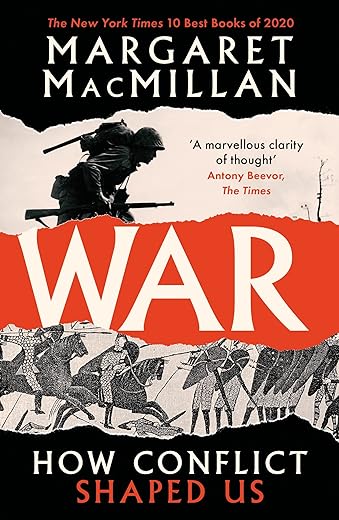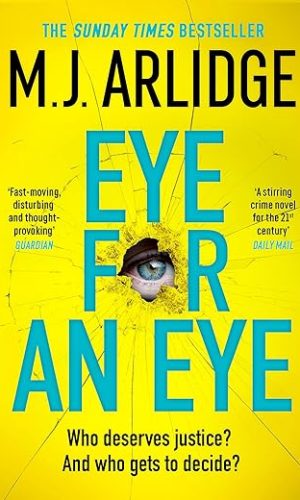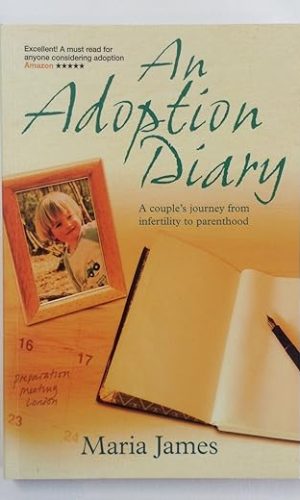War: How Conflict Shaped Us
£8.70£9.50 (-8%)
New York Times 10 Best Books of 2020
Sunday Times best books for Autumn 2020
Guardian critics’ pick for Autumn 2020
Wall Street Journal notable book of 2020
The time since the Second World War has been seen by some as the longest uninterrupted period of harmony in human history: the ‘long peace’, as Stephen Pinker called it. But despite this, there has been a military conflict ongoing every year since 1945. The same can be said for every century of recorded history. Is war, therefore, an essential part of being human?
In War, Professor Margaret MacMillan explores the deep links between society and war and the questions they raise. We learn when war began – whether among early homo sapiens or later, as we began to organise ourselves into tribes and settle in communities. We see the ways in which war reflects changing societies and how war has brought change – for better and worse.
Economies, science, technology, medicine, culture: all are instrumental in war and have been shaped by it – without conflict it we might not have had penicillin, female emancipation, radar or rockets. Throughout history, writers, artists, film-makers, playwrights, and composers have been inspired by war – whether to condemn, exalt or simply puzzle about it. If we are never to be rid of war, how should we think about it and what does that mean for peace?
Read more
Additional information
| Publisher | Main edition (7 Oct. 2021), Profile Books |
|---|---|
| Language | English |
| Paperback | 336 pages |
| ISBN-10 | 1788162579 |
| ISBN-13 | 978-1788162579 |
| Dimensions | 12.8 x 2.4 x 19.6 cm |










by Vin
I read the Kindle edition. Had I read the hard copy, I would have given it four stars. The Kindle version has none of the illustrations which compliment the narrative. This is a study which covers conflicts from thousands of years ago to those forecast for the future. There are some great facts; for example, I didn’t know the word ‘hookers’ to describe sex workers came from the American CIvil War. Union general, Joseph Hooker, took prostitutes with his columns for the pleasure of his men. Margaret MacMillan examines the causes of war – the growth of nationalism to perceived insults. There are some gaps or where conflicts are only covered briefly. The Northern Ireland troubles get no mention at all in the sections on internal conflicts. Modern warfare, such as ISIS and Al Qaeda are only mentioned in the conclusion. There is a potential line of study on the concept of permanent warfare; the West traditionally sees conflict as a linear process with a conclusion -victory. For fundamentalist terror groups, victory and defeat are just phases in a cycle. Losing power, in Afghanistan for example, is not a defeat – more a different stage of war. Some of the writing is bogged down with subordinate clauses which dilute the impact of a point. There is a long section on how war is depicted in art which, for me, is a distraction. That same chapter also looks at remembrance and how we construct narratives post-conflict which is insightful. For all these flaws, Margaret MacMillan does bring a rounded analysis of a massive subject in just over 300 pages.
by J R G HUGHES
I enjoyed Margaret MacMillan’s Reith Lectures on War. This is a great addition to those but also covers far more. I thoroughly recommend it.
by Livfoss
This gives an account of war, some history, some anecdotes, some attitudes, and makes one think about the whole phenomenon. Clearly the author knows a tremendous amount. I was hoping for more discussion about the contradiction at the heart of war – that it brings destruction and misery and yet has been a constant throughout human history. She does touch on the various peace movements, perhaps only to point out how weak they are. But in the end I felt, as a person lucky enough never to have experienced war at first hand, no clearer about why such terrible things happen, why societies consent to war, and if there is a believable psychological theory of war.
by Jaime Munoz Rengifo
wars have become a part of our history. This book show us the different ways that conflicts teach us, the present and the future that faces us, which will be far disappearing from our reality. Interesting and captivating.
by PadUser
I found this a thought-provoking and surprisingly enjoyable read. The subject matter is potentially overwhelming because there is so much source material (after all, people have always been fighting), but the author succeeds in containing it by interesting categorisation.
A major strength of the book is the examples and statistics used to illustrate the arguments. One theme running throughout the book is the way in which advances in technology change warfare. Readers may not be too surprised to learn that weapons with barrels have become more efficient. However MacMillan gives us the details about the relative efficiency of different canon throughout the ages and compares the killing power of a rifle used in 1865 with a modern Kalashnikov. And before reading this book, I had never considered the importance for warfare of the development of the riding stirrup.
It is a book which asks questions about what war is, why people go to war, how combatants and non-combatants experience war, how developments in society enable war, and about how people try to contain or prevent war. It is impressive in its scope, its authority, and in its readability.
by deputydog
….and talking of nutshells if you have an interest in how conflict has shaped society and don’t want to read a whole library this is the book for you. Easy to read and engaging on every page Margaret MacMillan walks the reader through history pointing out the clear lessons of conflict both bad and good. For me this is one of the most balanced accounts of the subject and reflects the complexities of the subject and the changing interpretation each generation May place on events. Important because our perception shapes the impact the event has and how we react. Well worth setting time aside to read and absorb, I feel I have a better understanding of the subject as a result and really quite enjoyed getting there.
by Ajibola A Adegbite
Reminds everyone that war has been central to human history and we shouldn’t easily dismiss war’s impact.
by Ian Clark
MacMillan’s clarity of thought and easy-to-read style are outstanding